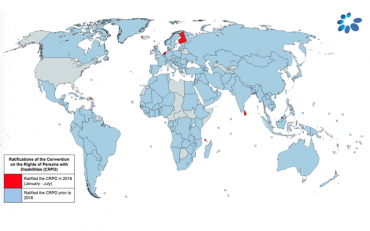2016 marks the ten year anniversary of the Convention on the Rights of Persons with Disabilities (CRPD), following its adoption on December 13, 2006.
The CRPD has been one the most quickly adopted international human rights treaties, with the goal of upholding the rights of persons with disabilities are protected in all countries. To date, 165 states and the European Union have ratified the convention, with a number of new ratifications in the past six months.
In its tenth anniversary year, a diverse group of states from all corners of the globe ratified the Convention. In the first half of the 2016 year, Antigua and Barbuda, Sri Lanka, Brunei Darussalam, Finland, the Netherlands, and Comoros all ratified the CRPD, bringing the total number of state parties to 166.
As of today, 32 states have still not yet ratified the Convention on the Rights of Persons with Disabilities. Of those states, 21 have taken the first step in becoming compliant with the CRPD, having signed it but are still yet to ratify the treaty.
There are states still waiting to ratify the treaty from all the global regions: with five in Asia, four in Africa, two in North America, one in Latin America and the Caribbean, four in Europe, and five in Oceania.
Of the remaining 11 states who have taken no action on the CRPD, neither signing nor ratifying the Convention, five are African nations, two are European, one is Oceanic, two are Asian, and one is North American.
With the recent wrap up of the ninth annual Conference of States Parties on the Convention on the Rights of Persons with Disabilities celebrating ten years of disability rights protection, signatory states have an opportunity to revisit or move forward with ratification of the CRPD in the second half of 2016.
In examining progress in the ten years following the adoption of the Convention, alongside celebration of the number of state parties who have ratified the CRPD in recent years, states should be conscious of the barriers to implementing the CRPD that still exist in many states and should collaborate with persons with disabilities in addressing and overcoming those challenges.

